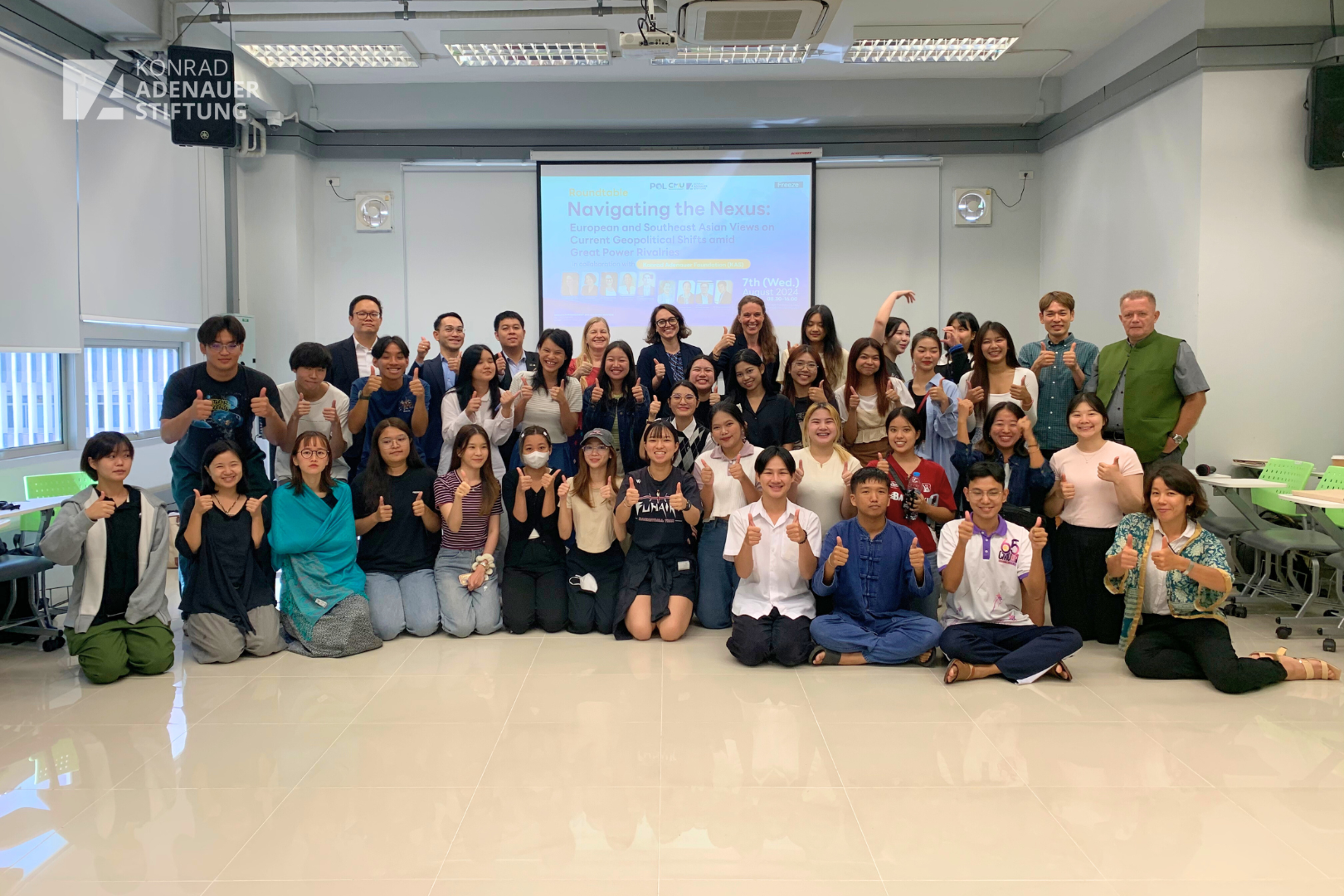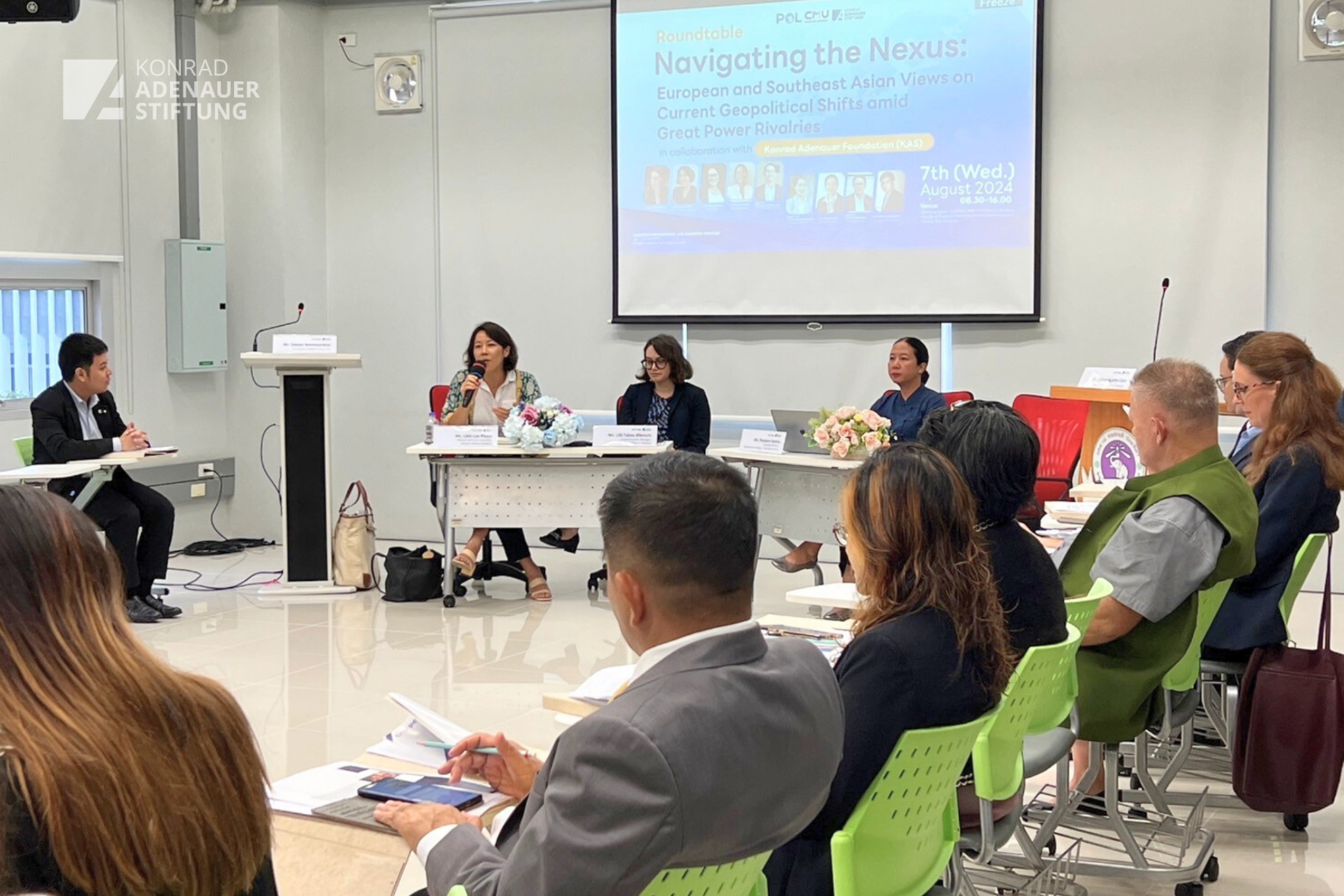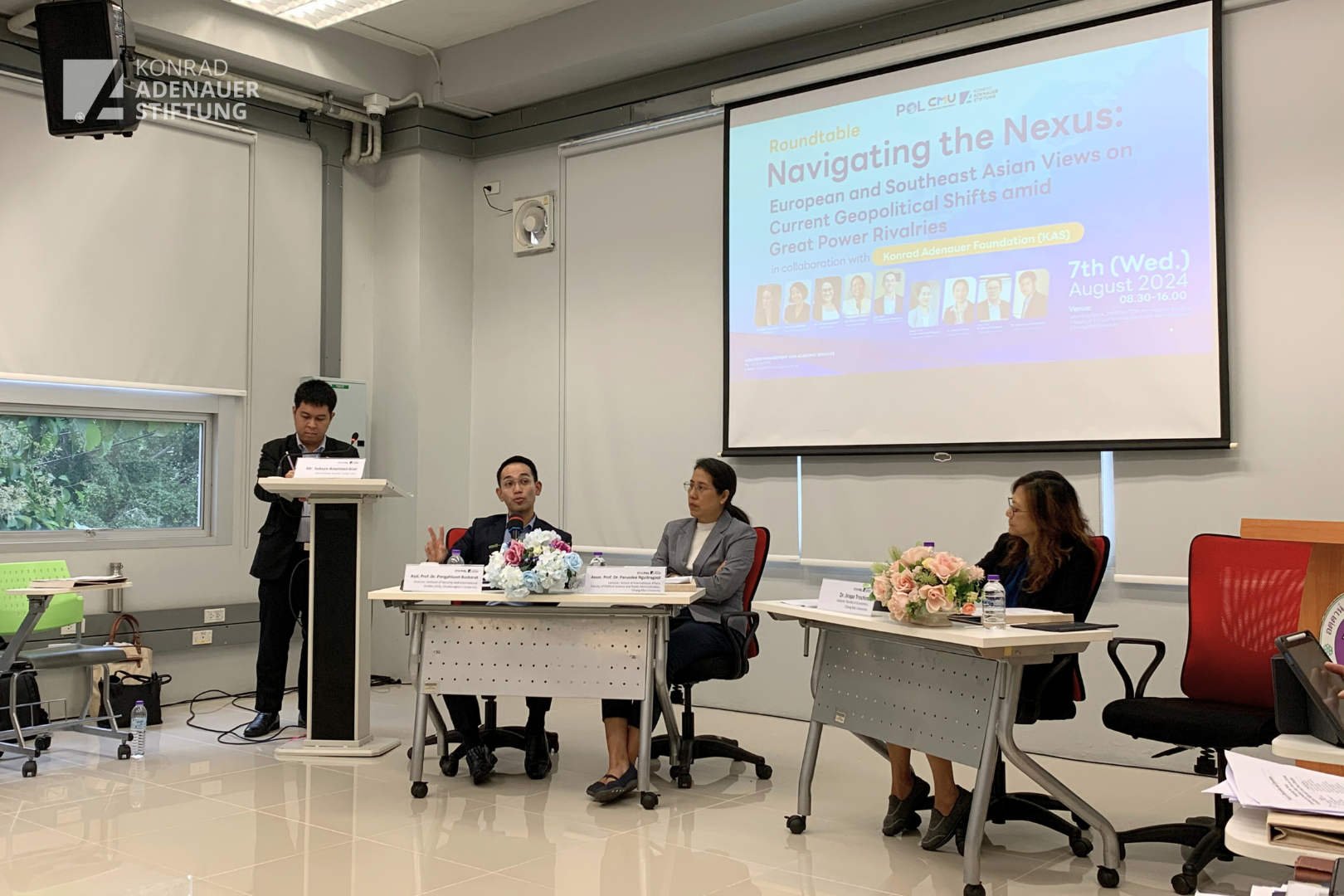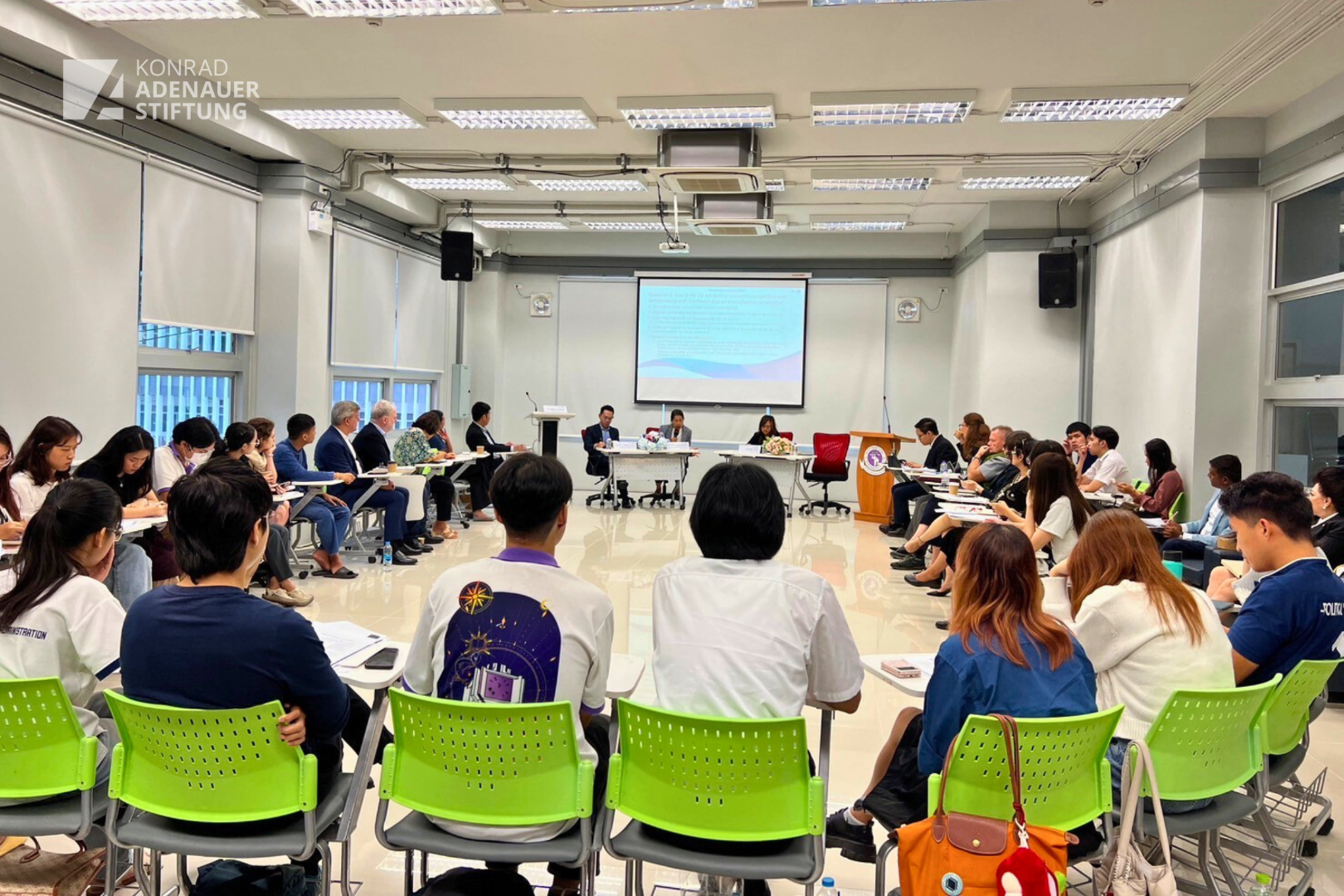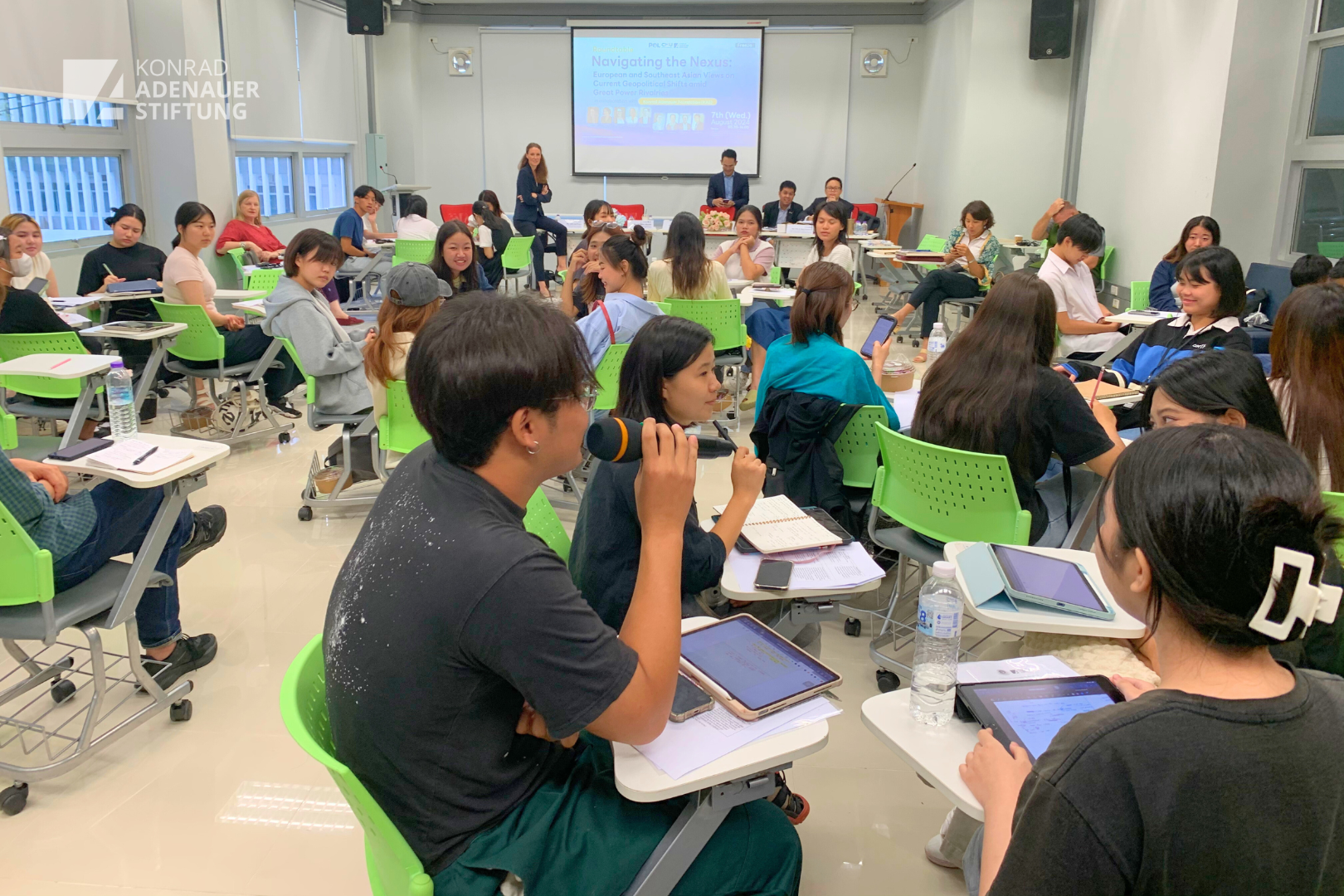รายงานกิจกรรม
First Morning Session: Strategic Partnerships and Opportunities for Cooperation
The discussion commenced by addressing the transnational challenges impacting multiple countries in the Mekong Subregion and beyond, especially concerning environmental issues. These challenges have substantial effects at both regional and global levels, particularly as the international community grapples with climate change. The EU views its investments and cooperation with the countries in the Mekong Subregion as a strategic response to these issues. The EU also monitors transnational issues such as migration, trafficking, and climate change. These challenges are inherently international, and the EU's engagement in the Mekong Subregion is driven by the need to address the transboundary nature of these problems, necessitating collective action and cooperation. Moreover, the EU is well-positioned to act as an impartial mediator in the region on this matter. The EU strategic interest in the region makes them a potential partner to tackle these challenges in the region.
Another perspective from the EU highlights that amid the competition between global powers like the US and China, one viable strategy for the EU to engage with countries in the Mekong Subregion and Southeast Asia is through trade. The EU has already established free trade agreements with Singapore and Vietnam, and negotiations are ongoing with Indonesia, the Philippines, and Thailand. This approach underscores the EU's strategy to diversify from reliance on China by enhancing supply chain resilience in Southeast Asia. This region presents significant opportunities to develop new supply chains, particularly in the production of semiconductors. As a major trading partner with the EU, Southeast Asia not only benefits from robust economic ties but also sees considerable cooperation and potential in sustainability initiatives.
Another area of cooperation is connectivity, which spans various aspects from infrastructure to mobility and digitalization. The EU implements connectivity projects through the "Global Gateway Initiative." Projects under the Global Gateway Initiative need to meet certain standards and criteria. For instance, projects and partners involved in this initiative must consider democratic values and foster equal partnerships. They are also required to adopt environmentally friendly practices; hence sustainability is a fundamental component across all facets of this cooperation. Additionally, these initiatives must prioritize security and aim to stimulate private sector investment. While these criteria might initially seem challenging and not easy to meet, they ensure that any long-term development is value-based and sustainable, and thereby ultimately support the countries in which projects are being implemented.
Security remains a major theme in the EU’s strategies in the region, particularly emphasizing maritime security. One significant initiative is CRIMARIO, an EU-funded maritime capacity building initiative that was initially established in the western Indian Ocean. In 2020, it was extended to cover Asia and, in 2021, it was extended across the Pacific to Latin America. These expansions illustrate the EU's commitment to the
Indo-Pacific region and the strategic importance for the EU. Related to security, the EU mainly focuses on projects that offer capacity building and information sharing in areas such as counterterrorism, cybersecurity, and crisis management, further underscoring its commitment to enhancing regional security.
Non-traditional security issues, particularly those arising from the utilization of the Mekong River in the Mekong Subregion, hold significant importance. The river, which flows through six countries, poses unique challenges for downstream nations that lack control over its utilization but are impacted by upstream activities such as dam construction and pollution. These activities affect the livelihoods of local populations, economic security, and environmental conditions. Civil society advocates for more effective mitigation mechanisms to address these issues and seeks to establish channels for local communities to voice their concerns and participate in decision-making processes. From the EU's perspective, initiatives like the Global Gateway Initiative offer a positive contribution, as all projects under this initiative are value-based, emphasizing adherence to democratic standards, good governance, and transparency. Sustainable development is considered the only viable path forward, intertwining elements such as climate change, security, and connectivity. This holistic approach is crucial for achieving real and lasting development.
Second Morning Session: Trade Cooperation and Economic Security
This session primarily focused on the issues of international trade and investment in the region, with China as a significant economic power. The discussion highlighted China's penetration of markets and economies in the region through its Belt and Road Initiative (BRI). The discussion revolved around the question of how the EU is navigating economic competition and collaborating with Southeast Asia, particularly in terms of supply chain management and critical raw materials.
For countries in the Mekong Subregion and ASEAN, key issues include unemployment, economic downturns, climate change, extreme weather, and growing economic tensions between global powers.
The EU, recognizing Southeast Asian nations as pivotal trade partners, can capitalize on this opportunity to deepen relationships within the region, which views the EU as a reliable and trustworthy ally.
Since the COVID-19 pandemic, global supply chains have proven susceptible to disruptions in a volatile, uncertain world. Many companies are looking to rebalance their supply chains by diversifying to minimize reliance on a single source, particularly China. Southeast Asia, with its rapidly growing economy and large market potential, presents an appealing alternative.
Accordingly, the EU should bolster trade and political ties with ASEAN, support sustainable development, and facilitate regional economic integration. Entering into free trade agreements with ASEAN states could remove trade barriers, lower costs, and encourage regulatory convergence, thereby strengthening economic ties.
Regarding the EU’s presence in the region and potential areas for cooperation, particularly in supporting universal values such as environmental, social, and governance (ESG) regulations, speakers highlighted several ongoing projects and areas of cooperation with ASEAN. These initiatives are deemed significant as they embody the values the EU prioritizes. Programs like the Global Gateway Initiative and the Free Trade Agreements are instrumental in contributing to regional economic development and integration in Southeast Asia. While bilateral and multilateral cooperations between the EU and Southeast Asian countries may not alone ensure full compliance with all ESG regulations, they are pivotal in stimulating institutional reforms and enhancing adherence to ESG standards.
First Afternoon Roundtable Session
The afternoon session featured a roundtable discussion with participants including students from the Faculty of Political Science and Public Administration at Chiang Mai University, and Japanese students from Akita International University, Japan.
The first afternoon roundtable centred on the theme of regional security in the Mekong Subregion, with a focus on how the EU and Thailand can collaborate to address security challenges in the region. Key questions included:
- How can the EU and Thailand work together to address security issues in the Mekong Subregion?
- What roles can each party play in fostering stability and peace?
The discussion aimed to explore the potential for enhanced cooperation between the EU and Thailand, particularly in tackling regional security issues and advancing economic integration through improved connectivity projects.
From a Southeast Asian perspective, security extends beyond traditional concerns, prioritizing non-traditional issues that directly impact daily life. These include drug problems, organized crime, cybercrime, and labour violations, such as Illegal, Unreported, and Unregulated (IUU) fishing. These persistent challenges require effective cooperation and offer a possibility for cooperation with the EU.
One pressing non-traditional security issue is the haze problem. Although cooperation within ASEAN has seen Germany and the EU invest in addressing such issues in Indonesia, the haze problem in the Mekong Subregion remains severe and demands greater international support.
Furthermore, the issue goes beyond cooperation to include the perception and visibility of such efforts. Despite numerous programs and initiatives between the EU and Southeast Asia, public awareness remains low. This highlights a significant gap in public diplomacy, underscoring the need for better communication to increase visibility and understanding of the ongoing cooperation and its benefits.
From a European perspective, traditional security cooperation in Southeast Asia and the Mekong Subregion is not a primary focus. As the EU does not have its own army, the EU does not position itself as a traditional security provider for this region. However, the EU and its member states recognize that non-traditional security issues are increasingly pressing and serious, particularly the growing and more lethal narcotics trade, cybersecurity and disaster risk reduction.
The rise in drug trafficking and consumption, both regionally and globally, with drugs becoming more potent and tailored to attract younger generations, presents a growing concern. This issue is also a significant concern for European countries. European embassies in the region are actively dealing with the impact of drug problems on their nationals. The EU has deployed drug enforcement specialists to work with Thai officials and developed anti-narcotic strategies to address these challenges.
On other security issues such as cybersecurity, maritime security, and anti-terrorism, the EU has several programs in collaboration with Thailand and the region. One such program is "Enhancing Security in and within Asia," in which Thailand participates. Through this initiative, Thai officials receive training and workshops from EU experts to strengthen their capabilities in addressing these security challenges.
For the EU, public diplomacy plays a crucial role in its regional engagement. While there are various initiatives aimed at increasing the EU's visibility, many of these activities are concentrated in Bangkok.
The EU should expand its presence beyond the capital and reach out to other provinces.
Another challenge is the misunderstanding of the EU's stance in the region. The EU does not seek to force countries in Southeast Asia to choose sides in global power dynamics. Instead, the EU acknowledges that such a choice is unrealistic. To improve its engagement, the EU should adapt its policies to better align with local realities and deepen its understanding of Southeast Asia. The EU also sees value in learning from other players in the region, such as China and Japan.
Member states of the EU are also keen to hear the perspectives of students on how they perceive the EU's role in the region, as this feedback is vital for refining their public diplomacy efforts.
Second Afternoon Roundtable Session
The last session of the activity was held in the format of group discussions. Students were split into small groups to brainstorm on the following points before presenting their points of view and gaining comments from experts in the room. The main points for this round were:
- What specific security challenges in the Indo-Pacific region should European countries prioritize on their policy agendas?
- How can European and Southeast Asian countries develop a joint framework to address these security challenges?
- How should European countries align their Indo-Pacific strategies with the interests and priorities of Southeast Asian nations? What steps should be taken to strengthen multilateral institutions and regional forums involving both European and Southeast Asian countries?"
Discussants identified several key areas where cooperation between the EU and Southeast Asia could be strengthened. Cybersecurity emerged as a crucial domain, reflecting the growing need to protect digital infrastructure and combat cybercrime in an increasingly connected world. Environmental protection and food security were also highlighted, emphasizing the need for sustainable development and resilience in the face of climate change and global food supply challenges.
Human rights and gender inequality remain important areas for collaboration, reflecting ongoing efforts to promote social justice and equality. The concept of security in everyday life, which includes education, health, economic stability, and poverty reduction, was underscored as vital to enhancing the overall sense of security within communities.
Drug trafficking, national border security, and economic security were identified as pressing issues that require concerted efforts at both national and regional levels. Additionally, the challenges posed by an aging society and the need for inclusive development were discussed, with a focus on ensuring that no one is left behind.
Human resource security was highlighted as particularly important, recognizing that the development and protection of human capital are essential for national growth. Ensuring that human resources are safeguarded and that their rights are respected was seen as a critical factor in sustainable development.
It was also noted that Thailand currently relies more on China than on Europe, a factor that could influence the dynamics of cooperation in these areas. This reliance suggests that future EU-Southeast Asia collaborations will need to navigate complex geopolitical relationships to be effective.
Report compiled by:
Asst. Prof. Dr. Wannapa Leerasiri, Faculty of Political Science & Public Administration, Chiang Mai University
Reviewed by: Lilli Tabea Albrecht and Orapan Suwanwattanakul, KAS Thailand
